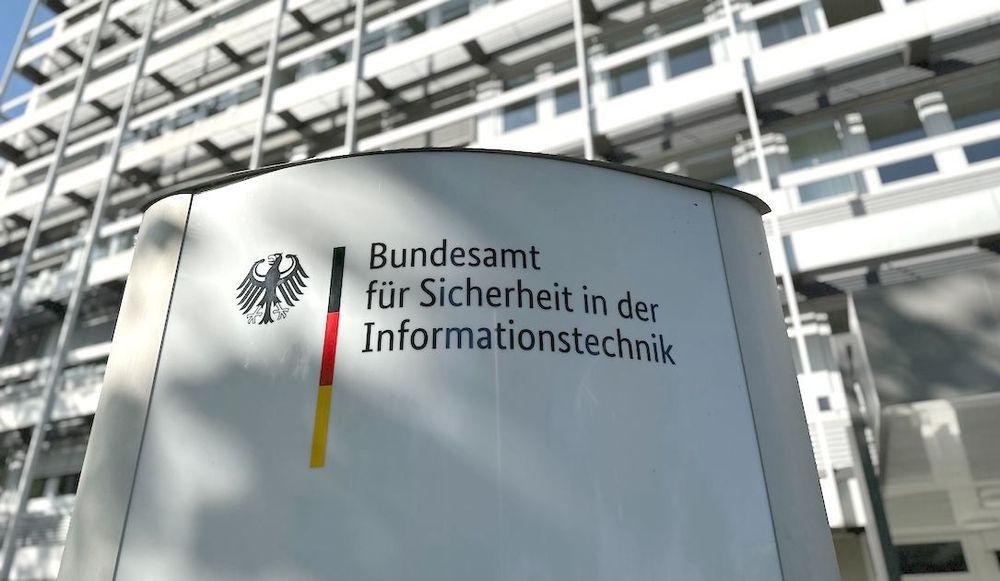Germany’s new cyber chief to ‘intensify and focus’ work shaping European rules
BONN, GERMANY — Claudia Plattner, the new president of Germany’s Federal Office for Information Security (BSI), told journalists she aimed to “intensify and focus” the agency’s work on using the levers of the European Union to improve cybersecurity in Germany and across the continent.
“I strongly believe that there is no point in trying to do cyber within one nation. That’s kind of like trying to tell water to remain on one side of the lake, it’s never going to work,” said Plattner during her official inauguration in Bonn on Monday.
A trained mathematician, Plattner was formerly the director general for information systems at the European Central Bank before joining the BSI at the beginning of July. She said that although the agency has existing bilateral relationships with several nations, “the European level” was “where you have the real levers where you can change things.”
Moving the agency to a position with a more significant influence over European legislation comes as the Interior Ministry also attempts to cement the BSI’s position inside Germany, where there are numerous state-based offices with similar functions.
Markus Richter, the state secretary at the Ministry of the Interior and the federal commissioner for information technology, said the government wanted to empower the BSI to become not just the entity providing cybersecurity advice to federal agencies, but also driving cybersecurity improvements between states.
But there were no moves to combine the work of the BSI with Germany's federal criminal police office (BKA) which takes the national lead on cybercrime, said Richter, who said the BKA will remain responsible for that issue.
It comes as the cybersecurity office also works to confirm its political independence in the wake of a scandal around the departure of its former president, following complaints (which were not upheld) that he had associated with a business connected to the Russian intelligence services.
‘Put facts on the table’
Similar efforts to assert the independence of cybersecurity offices are taking place elsewhere in Europe, where those agencies’ efforts to provide a source of expert technical advice can bring them into conflict with other government departments and sometimes political leaders.
The BSI — unlike the United Kingdom’s National Cyber Security Centre (NCSC) or Spain's Centro Criptólogico Nacional CERT (CCN-CERT) — is not affiliated with the country’s intelligence and law enforcement agencies, but is a traditional government department, meaning its operational independence may at times be questioned.
Asked about BSI’s ability to provide cybersecurity advice and guidance independently of what the Interior Ministry or other officials might want to communicate, Plattner said: “I’m tempted to say ‘Trust me, I will be heard’, but to be a little bit more professional about it: Yes, this is an ongoing discussion.
“As far as I’m concerned, I want to make sure that BSI is always able to put facts on the table. This is what we need to do. We are the experts when it comes to cyber. And we want to make sure that our opinion, our expertise, is listened to, and it’s there on the table for everyone plain to see.
“But we do acknowledge, of course, that there are topics that might look, you know, like a cube that looks blue from the one side, which is the cyber perspective, then there might also be another side if you look from the other perspective,” Plattner said.
She said it was the “privilege but also the responsibility” for the Interior Ministry or potentially other government departments to provide a holistic picture of the security issues, but the BSI had a commitment to provide its own expertise.
She added: “We want to make sure that we have strong partnerships with everyone in this process. Because if you’re just on the sidelines, you can also not act, you need to be on the playing field.”
Richter, the representative from the Interior Ministry, said: “The BSI is playing an important role in the cyber architecture in Germany. To do so it’s important to have good expertise and to bring the facts on the table. And that’s especially the role of BSI, and that’s why I’m so glad that Claudia Plattner is taking over the leadership now because she’s standing for this independent way of bringing up these topics.”
Correction: An earlier version of this story incorrectly described Italy’s ACN as affiliated with the country's intelligence services. The ACN is not part of the Italian intelligence community and instead reports directly to the Prime Minister.
Alexander Martin
is the UK Editor for Recorded Future News. He was previously a technology reporter for Sky News and a fellow at the European Cyber Conflict Research Initiative, now Virtual Routes. He can be reached securely using Signal on: AlexanderMartin.79



